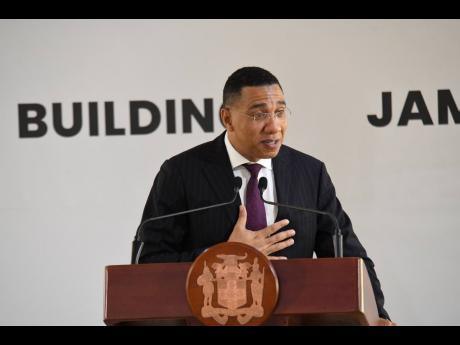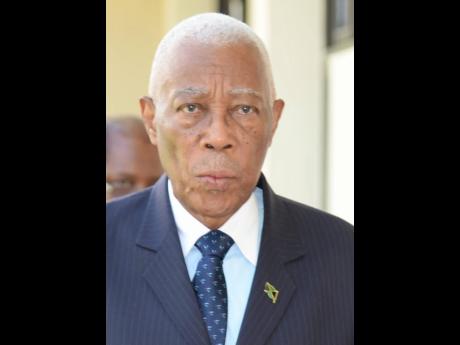A.J. Nicholson | Andrew Holness, Privy Council and the poor
Recently, announcing plans for municipal elections, Prime Minister Andrew Holness, not for the first time, stridently declared: “When I say that I love the poor but I hate poverty, you know what I mean”.
Who am I to doubt him? I can claim no greater wisdom than Judge J. Braxen Craven of the US Court of Appeals of the Fourth Circuit, proclaiming that if the Devil himself knows not the mind of man, how can judges know the motivation of legislators? Or of anyone else, others might ask.
Mr Holness based his assertion on the frame of his upbringing, insisting that his own circumstance provided incontrovertible evidence of education being the motive force for upward mobility.
Still, the prolific author, Unknown, holds that “actions prove who someone is; words just prove who they pretend to be”. There is also the biblical injunction: “By their deeds ye shall know them.”
After near 200 years, since 1833, when the Privy Council became Jamaica’s highest source of justice, considering the lamentable history of the vast majority of our citizens, economically deprived as the generations have been, our head of government could hardly quarrel with a pointed examination of his actions concerning his expressed love for the poor and their reach for justice.
The sight of argument before the court across the Atlantic in last month’s high-profile appeal beamed directly into the island, no doubt, provides an appropriate backdrop for that examination to be fairly conducted.
Hundreds of thousands of British pounds would have been expended for the several Jamaican attorneys on both sides to attend and for preparation and presentation of submissions, aside from a few minutes, by British silk.
This powerful basic reason that helped mightily in pushing the near total exodus of former British colonies from the Privy Council – most of the remaining few being in the Caribbean region – was played out right before our very eyes.
UNBOTHERED
And Jamaica’s Government remains completely unbothered that on this blatant score of inescapable prohibitive cost alone, the stark evidence is that ‘the poor’, plainly, have forever been excluded from access to their highest source of justice.
While readily rejoicing with those who can afford to open that expensive door to gain access, without which there is no chance, the Jamaican Bar Association, eye-openly, caringly, like most Jamaicans, appreciates the grave continuing societal injustice of the great majority being thereby barred.
The government ministers are unconcerned that on the long march of homo sapiens through history, Jamaicans occupy the lone spot of having to obtain a travel visa to gain access to one of their courts. The head of government bears the responsibility for ‘action’ to remove that one-of-its-kind demeaning imposition.
In strict adherence to the rule of law in our practising democracy, all Jamaica will accept the advice that was handed down by the British judges last Thursday.
But consider this: The advice long tendered by the Privy Council concerning the path to relieve our less-privileged citizens of the insurmountable burdens attached to petitioning their final court of justice calls for both sides, uncomplicated, to find common ground with a two-thirds majority vote calmly completed in each House of Parliament.
Incomprehensibly, the governing party leadership, themselves having sought that advice from the Privy Council, have defiantly, in autocratic fashion, brushed aside that ruling, insisting on a politically induced, ultra-expensive, potentially thorn-filled referendum route.
The prime minister has appointed two ministers and an attorney general to guide his Cabinet on issues relating, inter alia, to access for our people to their court of last resort. Those three law officers are products of the legal-education system provided by The University of the West Indies.
DEEP INTEREST
There is deep interest far and wide how within two decades of its inauguration in 2005, the regionally conceptualised Caribbean Court of Justice has gratifyingly received international acceptance, enjoying wide acclaim.
That interest stems, in no small part, from the respect that has been earned through the standard of reasoning that is pleasingly found in the court’s judgments. Such is the global acclaim of the CCJ, its Bench filled by judges who received their legal training within the regional university system, six of the present complement of seven judges have been verified accordingly.
His three law officers must have vigilantly advised him that the way-out-of-place projection of his mentor, Edward Seaga, the architect of Jamaica’s resistance against the regional court, that “a lesser breed of justice” flows from the CCJ must be rooted out of the Jamaican experience, led by him.
With Mr Holness’ expressed respect for the power of education, he would surely welcome their advice, which must proudly stress the global regard for the judges, trained, like them, under the regional university education system, and who would sit in final judgment at the Conference Centre in Downtown Kingston, with the heartwarming prospect of our own homegrown finely minted advocates deservedly, fittingly, pressing their submissions before Jamaica’s highest court of law.
Instead, we witness, in this year of our Lord 2024, the forgettable setting of the head of independent Jamaica’s prosecution service having received the same legal training, occupying a back-row seat at the British Court, appearing quite forlorn, watching British silk engaging British Law Lords on matters foreign to British interests, always Jamaica’s concern.
Mr Holness’ recent action on this subject matter of our apex court – considering the measuring rod of the author ‘Unknown’ – does not support his assertion of love for the poor. Quite the contrary! For his mandate given to the Government’s year-old Constitutional Reform Committee relegates issues concerning the benefit-bearing transition to the CCJ to be contemplated at some nebulous future season in time.
CONSEQUENTIAL ACTION
Meanwhile, what unanswerably precludes Mr Holness from truthfully asserting love for the poor regarding this historic issue is his consequential action, as opposition leader, in committing the most egregious breach ever against the country’s Independence Constitution, blocking proposed transformation from the Privy Council to the accessible, affordable regional court.
Across the broad expanse of former British colonies, the research has not unearthed any instance of any other leader of a political party meddling with the constitutional scheme for membership of their country’s Legislative Chamber, aimed at maintaining access to the Great Imperial Court available only to the privileged rich and well off.
In that, Andrew Holness stands awkwardly alone! Respectfully, it constitutes an unpardonable offence against the struggles of Their Excellences Sam Sharpe, Paul Bogle, and George William Gordon. Atonement is required, Mr Holness!
He has never apologised for leaving the stain of that shame-filled deed implanted on Jamaica’s legal and cultural landscape, strengthening the unconscionable paralysis of access for the poor.
This hardly believable episode in Jamaica’s history has to be dutifully and faithfully recorded otherwise future generations would scarce understand how, after six decades of political independence, such shameless uncaring and immaturity could have been on display at the highest level of the authorities.
Five months ago, last October, in the House of Representatives, one of his law ministers, unsolicited, announced that the prime minister would, “in short order”, address the country on these issues. Jamaicans, unsurprisingly, including Mr Holness’ beloved poor, have simply been duped, once again!
A.J. Nicholson is former minister of justice of Jamaica. Send feedback to columns@gleanerjm.com


